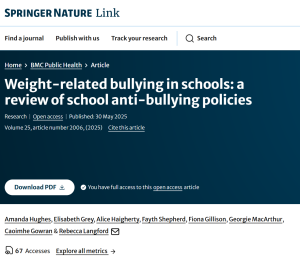Study reveals schools failing to address most common form of bullying: Weight-based victimisation
2 June 2025
A concerning gap in school anti-bullying policies has been revealed in a National Institute for Health and Care Research (NIHR) funded study at the University of Bristol and University of Bath. While weight-based bullying is reportedly the most common form experienced by students, fewer than 7% of schools in southwest England explicitly address it in their anti-bullying policies according to the study published in BMC Public Health.
The study team audited 255 secondary school policies across seven local authorities. They found schools are significantly more likely to name other forms of bullying, such as race, religion or sexual orientation, while neglecting to mention weight.
Bullying in relation to appearance was mentioned in just under half of the policies reviewed. However, the researchers argue that this is too general as a category. It could encompass identifiers of race, religion, sexual orientation and other physical characteristics, as well as weight.
Dr Beki Langford, Lecturer in Public Mental Health and senior researcher on the project, said:
“Weight is far more likely to be the reason a child is bullied, yet most school policies don’t even mention it. This disconnect may be unhelpful by not sending a clear message that weight-related bullying is wrong.”
Key findings
- Only 6.7% of anti-bullying policies mentioned weight-related bullying specifically
- Just under half (48.6%) mentioned bullying in relation to appearance
- By contrast, race (94.5%), sexual orientation (93.3%) and gender (85.9%) were far more frequently cited
- Private schools were three times more likely than state schools to mention weight-based bullying (17.5% vs. 6.1%)
- None of the 67 special schools included references to weight-related bullying
The study suggests that schools are heavily guided by the UK Equality Act 2010, which does not list weight as a protected characteristic. As a result, some policies include categories less relevant to school-aged children – such as marital status – more frequently than weight.
Researchers argue that explicitly including weight in anti-bullying policies is a simple yet powerful step. US-based studies show that specific policy wording can reduce weight bias and victimisation, particularly when combined with staff training.
Dr Lis Grey, Research Fellow at the University of Bristol and ARC West and co-lead of the study, said:
“Teachers want to address this issue but often lack the confidence or training. Naming weight explicitly in policies is just the beginning. Schools must be equipped with the tools and support to make these policies meaningful.”
Recommendations
- Policy inclusion: Schools should explicitly reference weight-related bullying in anti-bullying policies.
- Training and resources: Materials and training on identifying and addressing weight-related bullying should be co-developed with students, staff, and expert organisations.
- Impact evaluation: Changes in policy language and efforts to address weight-related bullying must be accompanied by rigorous evaluation of their effectiveness.
The researchers call for national attention on this overlooked form of discrimination, urging schools, policymakers, and education authorities to close the gap between policy and pupils’ lived experiences.
The study was supported by the NIHR Applied Research Collaboration (ARC) West and the Medical Research Council Integrative Epidemiology Unit.
Paper
